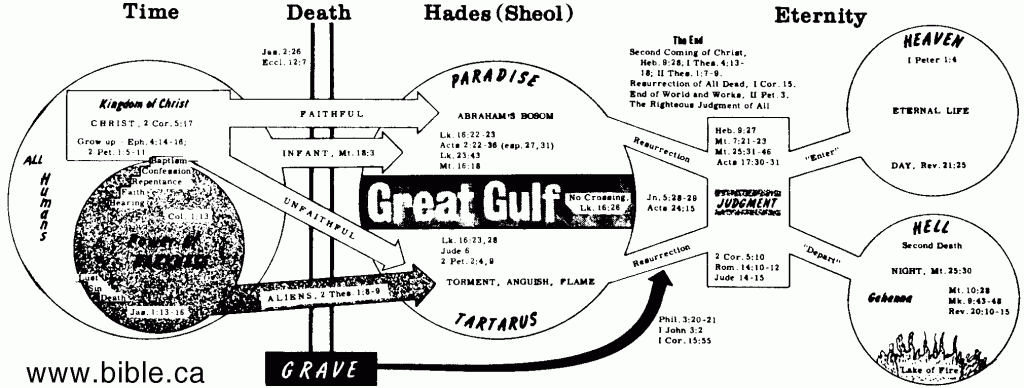Anonymous asks:
Do you agree with the image at the link below regarding after death happenings? http://www.bible.ca/hades-lk-16.gif
[Image reproduced here]

Thanks for the question. The answer is “mostly.” It is a diagram that refers to the “intermediate state” – that state of existence between a person’s physical death and the return of Christ and the final judgement. I’ve answered a question on this topic previously.
The diagram draws heavily on the Luke 16 parable of the Rich Man and Lazarus which portrays an existence in which there is a “great gulf” between the (righteous) Lazarus and Abraham and the (unrighteous) Rich Man. I assume the word “paradise” is taken from Christ’s proclamation on the cross to the one crucified next to him. “Tartarus” is a word from Greek Legend to do with the lowest reaches of the heavens and earth; it is not a biblical word and it is careless to use it.
Within the domain of “all humans” (circle on the left) you have a division between the “Power of Darkness” and the “Kingdom of Christ.” There is tartaric doom for those who are in the power of darkness and the “unfaithful” in the kingdom of Christ. I’m not sure what the originator is getting at here but this framework doesn’t sit well with me. The simple demarcator is Christ as Messiah and those that are “in Christ” by covenant of grace through faith and those who are not. I’m not too unhappy with “infants” being classified as those childlike innocents to which the Kingdom of God belongs but in my mind individualistic soteriological analysis such as this is unhelpful. The people of God are in Christ in paradise when they die, that is all that needs be said.
I have no problem with a general resurrection occurring before a final judgement at the end. I do have a difficulty with what follows that event. “Heaven” is a nebulous term. The way we use the word (as in “go to heaven when we die”) is actually more of a referent to the sense of paradise in the intermediate state. The resurrection glory that follows the general resurrection is not so much heavenly but immortal, glorified, new heavens and new earth including some sense of imperishable physicality. Consider 1 Cor 15.
And I am of the opinion that the Lake of Fire for those who are not in Christ is not a gateway to eternal torment but the means of the true eternal punishment – eradication of existence itself. In this sense, unless I can be convinced otherwise, I am something of an annihilationist.
Hope that helps.



